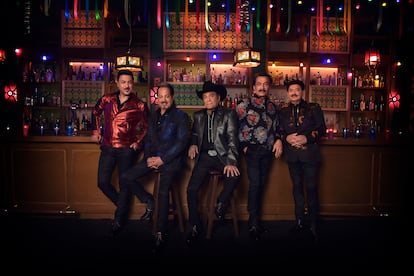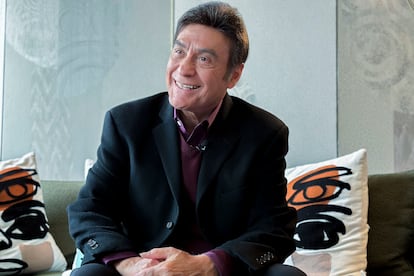Los Tigres del Norte: ‘Our songs are like four-minute soap operas’
After a 14-year absence, the veteran Mexican regional music band is back in Spain on a five-city tour

“I like corridos because they’re about our people.” Those words can be heard at the beginning of Jefe de Jefes (Boss of all Bosses) by Los Tigres del Norte. This Mexican band wasn’t the first to popularize regional music – Los Donneños and Los Alegres de Terán came before them. But Los Tigres del Norte took this northern Mexican ranch music around the world with over 700 songs recorded, 40 million albums sold, and seven Grammy Awards. The corrido began as a way of sharing news about the Mexican Revolution in the early 20th century. Today, Los Tigres have brought corridos to major music festivals like Coachella, and superstars like Peso Pluma, Snoop Dogg and Bad Bunny have all performed “tumbados” that fuse traditional corrido style with other music genres like trap, hip-hop and reggaeton.
“There is still a lot to learn,” said the group’s leader, Jorge Hernández, who 55 years ago convinced five of his 10 brothers to form a band and head to northern Mexico. The band’s first paychecks were sent home to Sinaloa to cover their father’s medical expenses for a back injury. Los Tigres, who have been living in the United States for the last few years, have embarked on a European tour that includes five cities in Spain and wraps up in London in April. The group also released a new single called Pan y Miel (Bread and Honey) in June.
Throughout their 55-year career, the group has consistently focused on key themes in their songs: border violence (Las mujeres de Juárez), heartbreak (Lágrimas), the migrant experience (We are more Americans), and even drug trafficking. La banda del carro rojo (The red car gang) first linked Los Tigres to the criminal underworld with its lyrics about the allure and tragedy of drug cartels. Soon after, the term “narcocorrido” was coined. Despite the controversy and occasional censorship of narcocorridos, younger performers like Peso Pluma persist in performing them. “The whole narcocorrido thing used to infuriate us, but we’ve gotten over it,” said Jorge, the eldest of the Hernández brothers. Los Tigres del Norte are now in Madrid for the initial performances of their European tour.
Question. What memories do you have from your previous visits to Spain?
Answer. When we first came here, we were excited to explore new countries and continents. Now, it’s a different feeling as we bring new songs to captivate new audiences. After all these years, there’s still a mix of anticipation and fear, but we’re much more confident now.
Q. Do you feel like there are any goals you haven’t achieved yet after 55 years of playing music?
A. There are so many things to do and countries to visit, but there’s just not enough time. We’d absolutely love to spend more time in Peru, because it’s a country that really motivates us to excel. And there are some European countries with large Hispanic populations that we’d like to reach.
Q. So the Tigres will be around for awhile?
A. That’s what we want, you know? We all want things to last a lifetime, but we understand that everything comes to an end. As long as we’re alive and God blesses us with the skills to do our thing, we’ll stick around for a while.
Q. How did corridos, a style so rooted in local folklore and culture, become a global trend?
A. Our songs are like stories. Corridos, they talk about politics, love, heartbreak – it’s spoken music. We even have some songs with no singing, just talking! We try to make them like soap operas – four-minute soap operas.
Q. What do you think about tumbados and all the international success they’re having?
A. The world we live in is always changing and the younger generations are always finding new ways to have fun. There are music genres to suit everyone’s taste. Who knows how long this trend will last, but we definitely wish them success.
Q. Have you thought about riding this wave by collaborating with someone who plays urban contemporary music?
A. I really hope that one day we get the chance, it would be absolutely fabulous! We actually did an MTV Unplugged a while back and had some amazing artists join us like René, Zack de la Rocha, Paulina Rubio, Juanes, and Andrés Calamaro. We’re always striving to keep things fresh and make a real impact.

Q. You and the band have been censored a few times...
A. The only time I remember we had a problem was when a radio station didn’t want to play our song [El reportero] about a Tijuana reporter from La Z [radio station]. He was disappeared for his political reporting and our song was about him. Sometimes, in certain cities, they asked us not to sing specific songs because political campaigns were underway. We always agreed, but we’d ask why and then try to play them at the next concert.
Q. Do you feel comfortable with the term narcocorridos?
A. The term comes from a book [Narcocorrido: A Journey into the Music of Drugs, Guns, and Guerrillas] that a friend from Boston wrote after interviewing us. I told him it was fine to use that word, but I never really thought it would get so popular. The first time we were in Spain, they were like, “Hey, the guys who sing narcocorridos are here!” It made me mad at first, but I got over it. People can write whatever they want.
Q. Peso Pluma had to cancel several concerts recently due to cartel threats. Did that ever happen to you?
A. Never. Back then, you know, it was like this whole new thing to talk about drug trafficking. I think it all started with Contrabando y traición [Smuggling and betrayal]. The song really caught on and suddenly everyone associated us with those kind of corridos. They even made a movie about it in 1976. Film producers started reaching out to us because they wanted our songs for their movies, and we ended up appearing in 18 films.
Q. Has the relationship between brothers influenced the typical disputes within a band?
A. We’ve always aimed for harmony. Being brothers is great because it keeps us united and forgiving towards each other when issues come up. Of course, there needs to be discipline and someone has to lead. But everyone knows how to behave. We understand that this is our life and we have to be on the same page to reach our goals.
Sign up for our weekly newsletter to get more English-language news coverage from EL PAÍS USA Edition
Tu suscripción se está usando en otro dispositivo
¿Quieres añadir otro usuario a tu suscripción?
Si continúas leyendo en este dispositivo, no se podrá leer en el otro.
FlechaTu suscripción se está usando en otro dispositivo y solo puedes acceder a EL PAÍS desde un dispositivo a la vez.
Si quieres compartir tu cuenta, cambia tu suscripción a la modalidad Premium, así podrás añadir otro usuario. Cada uno accederá con su propia cuenta de email, lo que os permitirá personalizar vuestra experiencia en EL PAÍS.
¿Tienes una suscripción de empresa? Accede aquí para contratar más cuentas.
En el caso de no saber quién está usando tu cuenta, te recomendamos cambiar tu contraseña aquí.
Si decides continuar compartiendo tu cuenta, este mensaje se mostrará en tu dispositivo y en el de la otra persona que está usando tu cuenta de forma indefinida, afectando a tu experiencia de lectura. Puedes consultar aquí los términos y condiciones de la suscripción digital.









































